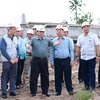The meeting of senior ASEAN officials plus China, Japan and the Republic of Korea (ASEAN+3) on the environment opened in Hanoi on August 6.
The meeting aims to review the outcomes of ASEAN+3 cooperation, make new proposals and prepare for the ninth ASEAN+3 Environment Ministerial Meeting.
The participants informed China, Japan and the Republic of Korea of the progress of environmental education projects from 2008 to 2012, including the ASEAN youth forum on sustainable development and the ecological school programme.
They suggested stepping up the exchange of knowledge and experience to ensure sustainable development and promote the development of green technologies.
Japan pledged 70 million USD through the ASEAN Development Foundation and the ASEAN-Japan Cooperation Foundation, 52 million USD to narrow the development gap in the region, and 325 million USD to boost exchanges between young people over a five-year period. Japan also vowed to cooperate with ASEAN member countries to draw up a “three-R” Reduce, Reuse, and Recycle plan.
ASEAN members recognised China’s initiative on the ASEAN-China environment cooperation strategy for the 2009-2019 period aimed at establishing an ASEAN-China environmental centre, which would function as a consultative and technical agency.
The Republic of Korea (RoK) also offered financial assistance to organise both short-term training courses and post-graduate training programmes for students and trainees from ASEAN member countries to increase the capacity of workers in the fields of environment and wetlands management and development.
The eighth ASEAN+3 senior officials meeting on the environment is scheduled to be held in Brunei in August, 2011./.
The meeting aims to review the outcomes of ASEAN+3 cooperation, make new proposals and prepare for the ninth ASEAN+3 Environment Ministerial Meeting.
The participants informed China, Japan and the Republic of Korea of the progress of environmental education projects from 2008 to 2012, including the ASEAN youth forum on sustainable development and the ecological school programme.
They suggested stepping up the exchange of knowledge and experience to ensure sustainable development and promote the development of green technologies.
Japan pledged 70 million USD through the ASEAN Development Foundation and the ASEAN-Japan Cooperation Foundation, 52 million USD to narrow the development gap in the region, and 325 million USD to boost exchanges between young people over a five-year period. Japan also vowed to cooperate with ASEAN member countries to draw up a “three-R” Reduce, Reuse, and Recycle plan.
ASEAN members recognised China’s initiative on the ASEAN-China environment cooperation strategy for the 2009-2019 period aimed at establishing an ASEAN-China environmental centre, which would function as a consultative and technical agency.
The Republic of Korea (RoK) also offered financial assistance to organise both short-term training courses and post-graduate training programmes for students and trainees from ASEAN member countries to increase the capacity of workers in the fields of environment and wetlands management and development.
The eighth ASEAN+3 senior officials meeting on the environment is scheduled to be held in Brunei in August, 2011./.



















